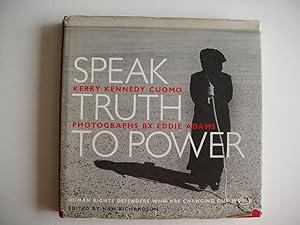Synopsis
Speak Truth to Power presents an inspiring rainbow of heroes from more than thirty-five countries and five continents. In searing and uplifting interviews, veteran human rights defender Kerry Kennedy Cuomo examines the quality of courage with women and men who are dramatically changing the course of events in their communities and countries.
Imprisoned, tortured, and threatened with death, they speak with compelling eloquence on subjects to which they have devoted their lives and for which they have been willing to sacrifice -- from free expression to the rule of law, from women's rights to religious liberty, from environmental defense to eradicating slavery, from access to capitol to the right to due process.
Accompanying the interviews are a powerful series of portraits by world-renowned photographer Eddie Adams. This is his first book, representing two years of crisscrossing the globe to make these deeply felt and insightful images of courageous individuals, including the internationally celebrated, such as Vaclav Havel, Baltasar Garzón, Helen Prejean, Marian Wright Edelman, and Nobel Prize Laureates the Dalai Lama, Desmond Tutu, Elie Wiesel, Oscar Arias Sánchez, Rigoberta Menchú Tum, José Ramos-Horta, and Bobby Muller. But the vast majority of the defenders are unknown and (as yet) unsung beyond their national boundaries, such as former sex slave and leading abolitionist Juliana Dogbadzi of Ghana, domestic violence activist Marina Pisklakova of Russia, mental disability rights advocate Gabor Gombos of Hungary, and more than thirty others.
Speak Truth to Power is accompanied by a major exhibition opening at The Corcoran Gallery of Art, Washington, D.C., then traveling nationally, beginning in January 2001 at the Newseum, New York. The authors also plan a fully integrated Web Site as well as an education and advocacy campaign by Amnesty International.
In addition, a theatrical presentation, written by Ariel Dorfman, based on the stories featured in the book, will be performed by internationally known actors, including Glenn Close, Edward James Olmos, Sigourney Weaver, Alfre Woodard, and others, opening at the J. F. Kennedy Center, September 19, 2000.
About the Author
Kerry Kennedy Cuomo is the mother of three girls, Cara, Mariah, and Michaela. She started working in human rights in 1981; since then, her life has been devoted to the establishment of equal justice. She has led more than forty human rights delegations to more than thirty countries. Kennedy Cuomo established the Robert F. Kennedy Center for Human Rights in 1987 to ensure the protection of rights codified under the U.N. Declaration of Human Rights. She has worked on diverse human rights issues such as child labor, disappearances, indigenous land rights, judicial independence, freedom of expression, ethnic violence, the environment, and women's rights. Ms. Kennedy Cuomo serves as Chair of the Amnesty International Leadership Council and serves on boards or advisory committees for the Lawyers Committee for Human Rights, The Bloody Sunday Trust, the Robert F Kennedy Memorial, the Gleitsman Foundation, the National Coalition to Abolish the Death Penalty, the Committee on the Administration of justice (Northern Ireland), and the International Campaign for Tibet among others. She is a member of the Massachusetts and District of Columbia bars.
Eddie Adams, winner of the 1969 Pulitzer Prize and recipient of more than 500 international, national, and local awards, is one of the most decorated and published photographers in America today. Adams's photographs have been seen on the covers and front pages of international publications including Time, Newsweek,New York Times, Stern, Paris Match, Parade, Vanity Fair, Life, and London Sunday Times. His portraits include leaders world wide from presidents Nixon, Ford, Carter, Bush, Reagan, and Clinton to more than fifty heads of states, including Fidel Castro, François Mitterand, the Shah of Iran, Indira Gandhi, King Hussein of Jordan, King Juan Carlos of Spain, Yitzhak Rabin, Pope John Paul, and Deng Xiao-Ping of China. But Adams's earliest pictures, and those for which he is canonized in photographic history, stem from his coverage of the ravages of thirteen wars. In Vietnam he went on more than 150 operations. In 1968 he photographed the indelible picture of the Saigon police chief shooting a Vietcong prisoner at point-blank range, for which he received the Pulitzer Prize. In 1977 his photographs of the boat people escaping Vietnam contributed to Congress's decision to admit 200,000 Vietnamese to America.
"About this title" may belong to another edition of this title.

